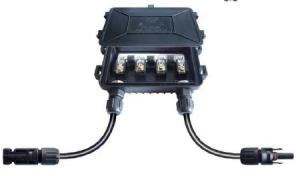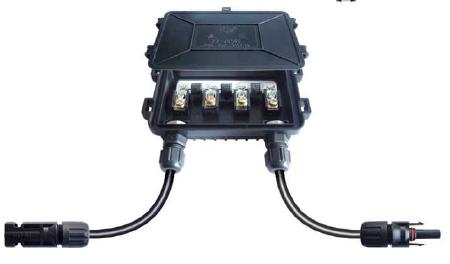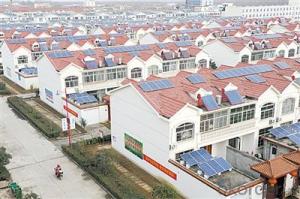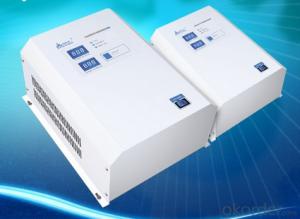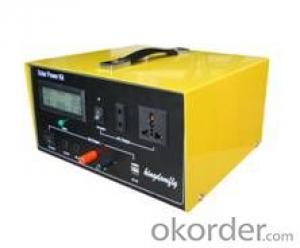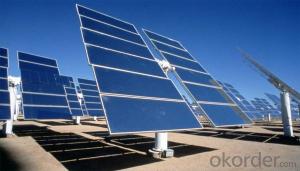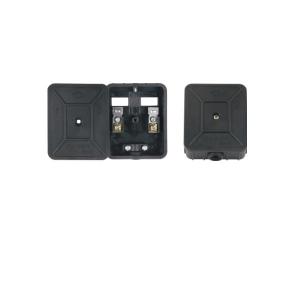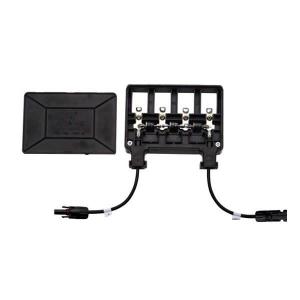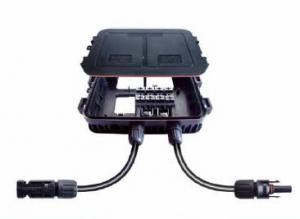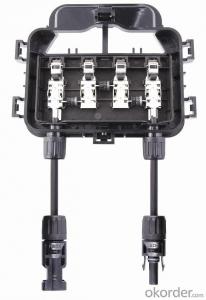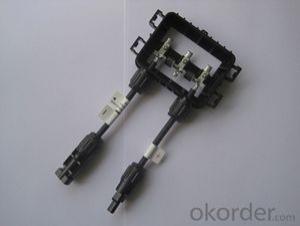Solar Junction box PV-JB080
- Loading Port:
- China Main Port
- Payment Terms:
- TT OR LC
- Min Order Qty:
- -
- Supply Capability:
- 10000 set/month
OKorder Service Pledge
OKorder Financial Service
You Might Also Like
Solar Junction box,Due to highly robustness,UV-resistance,the touch protection a high grade connection is guaranteed for many years.
Rated voltage 1000 V
Rated current 16A
Contact resistance ≤5mΩ
Dia of pin or socket 3mm /4mm
Protection degree(mated,junction box closed/unmated) IP65/IP2X
Operating temperature -40 C to +85C
Insulation material PPO
Contact material Copper,silver plated
- Q: How do solar energy systems impact roof maintenance and repairs?
- Roof maintenance and repairs can be affected both positively and negatively by solar energy systems. On the positive side, solar panels offer an extra layer of defense for the roof, shielding it from harsh weather and harmful UV radiation. This protective measure helps extend the roof's lifespan, minimizing the need for frequent repairs or replacements. Moreover, solar panels prevent debris accumulation, reducing the risk of damage caused by fallen leaves, branches, or other objects. However, there are certain considerations to keep in mind regarding roof maintenance and repairs with solar energy systems. The installation of solar panels typically involves drilling holes into the roof to secure the mounting brackets. If not properly sealed, this process may result in leaks. Hence, it is crucial to collaborate with experienced and qualified installers who understand the significance of proper sealing and waterproofing. Another aspect to consider is the accessibility of the roof. Solar panels cover a significant portion of the roof surface, making it more challenging to access and inspect. Routine roof maintenance tasks like gutter cleaning, debris removal, and damage inspection may require additional effort and specialized equipment when solar panels are present. When it comes to repairs, solar panels can complicate the process. If a repair is necessary on the roof, the solar panels may need to be temporarily removed to access the damaged area. This can increase the time and cost involved in the repair process. Additionally, it is crucial to coordinate with the solar panel manufacturer or installer to ensure that any repairs are conducted in a manner that does not void the warranty or impact the performance of the solar system. In conclusion, solar energy systems can positively impact roof maintenance by providing additional protection and reducing the risk of damage. Nonetheless, it is important to collaborate with experienced installers, ensure proper sealing, and consider the implications on accessibility and repairs when installing solar panels.
- Q: How does solar energy impact the environment?
- Solar energy has a positive impact on the environment as it is a clean and renewable source of energy. By harnessing the power of the sun, solar energy reduces greenhouse gas emissions, air pollution, and dependence on fossil fuels. Additionally, it helps in conserving valuable resources and mitigating climate change, making it a sustainable and eco-friendly option for meeting our energy needs.
- Q: How does the cost of solar panels vary based on the manufacturer?
- The cost of solar panels can vary significantly based on the manufacturer. There are several factors that contribute to the price differences among manufacturers. Firstly, the quality and efficiency of the solar panels can vary between manufacturers. Some manufacturers invest heavily in research and development to improve the efficiency of their panels, resulting in higher-priced but more efficient products. These panels can generate more electricity per square meter, ultimately providing better value for money in the long run. Secondly, the reputation and brand recognition of a manufacturer can impact the cost of their solar panels. Well-established manufacturers with a strong track record of producing reliable and durable panels tend to have higher prices. This is because their products are often perceived as more trustworthy and are backed by extensive warranties and customer support. Thirdly, the manufacturing scale and volume can influence the cost. Larger manufacturers often benefit from economies of scale, allowing them to produce solar panels at a lower cost per unit. They can negotiate better terms with suppliers, have access to advanced production technologies, and optimize their operations more efficiently. These cost savings can be passed on to consumers, resulting in more competitive prices. Lastly, the country of origin can affect the cost of solar panels. Manufacturing costs can vary significantly depending on the labor and production costs of different regions. Panels manufactured in countries with lower labor costs may have a lower price tag compared to those made in countries with higher labor costs. It is important to note that while cost is a crucial factor, it should not be the sole consideration when choosing solar panels. Other aspects such as warranty, durability, efficiency, and after-sales support should also be taken into account.
- Q: Can solar energy systems be used for outdoor recreational activities?
- Yes, solar energy systems can definitely be used for outdoor recreational activities. Solar panels can be installed on rooftops, RVs, boats, and other outdoor structures to generate electricity. This renewable energy source can power various devices and equipment used during recreational activities such as camping, hiking, and boating. Solar energy systems provide a sustainable and environmentally friendly way to enjoy outdoor activities without relying on traditional power sources.
- Q: Can solar energy systems be used in areas with limited access to solar energy regulations and policies?
- Yes, solar energy systems can still be used in areas with limited access to solar energy regulations and policies. While regulations and policies can play a crucial role in promoting and supporting the use of solar energy, they are not the sole determining factor in deploying solar energy systems. In areas with limited regulations and policies, individuals, businesses, and organizations can still invest in solar energy systems for their own use or to meet specific energy needs. Additionally, advancements in technology and decreasing costs make solar energy systems increasingly viable even in areas without extensive regulations and policies.
- Q: What is the impact of electromagnetic interference on the performance of solar panels?
- Electromagnetic interference can have a negative impact on the performance of solar panels. It can disrupt the proper functioning of the panels, causing fluctuations in the power output and reducing the efficiency of the system. This interference can be caused by nearby electronic devices or power lines, and can lead to decreased energy production and potential damage to the panels. Implementing appropriate shielding and mitigation techniques is crucial to minimize the impact of electromagnetic interference on the performance and longevity of solar panels.
- Q: Can solar energy systems be used for powering manufacturing facilities?
- Manufacturing facilities can definitely employ solar energy systems to power their operations. In fact, many manufacturing facilities worldwide are already taking advantage of solar energy to fulfill their power needs. Installing solar energy systems, like photovoltaic (PV) panels, on the roofs or surrounding areas of manufacturing facilities allows for the generation of clean and renewable electricity. This electricity can then be used to operate various processes and equipment within the facility. There are several advantages associated with using solar energy systems for manufacturing facilities. Firstly, solar energy is a sustainable and renewable power source that does not deplete natural resources or contribute to climate change. By utilizing solar power, manufacturing facilities can significantly reduce their carbon footprint and contribute to a greener and more sustainable future. Secondly, solar energy systems provide a consistent and reliable source of electricity, which is crucial for manufacturing facilities that require uninterrupted power supply for their operations. By generating their own electricity through solar power, these facilities can reduce their dependence on the grid and avoid potential disruptions or outages. Moreover, solar energy systems help manufacturing facilities save on energy costs in the long run. While the installation costs of solar panels may initially be high, the operational costs are significantly lower compared to traditional energy sources. Once the solar energy system is in place, the facility can benefit from free sunlight, leading to savings on electricity bills over time. It is important to note that the feasibility of using solar energy systems for manufacturing facilities may vary depending on factors such as the facility's size, available space for solar panel installation, and energy requirements of manufacturing processes. However, advancements in solar technology and decreasing costs of solar panels are making it increasingly economically viable and environmentally responsible for more manufacturing facilities to switch to solar energy systems. In conclusion, solar energy systems can effectively power manufacturing facilities, offering various benefits including sustainability, reliability, and cost savings. As the world moves towards a cleaner and more sustainable energy future, solar power presents a compelling solution for manufacturing facilities seeking to reduce their environmental impact while maintaining a dependable source of electricity.
- Q: Solar power generation system suitable for home, how much is the cost of a set?
- Then the 1000 Watt Solar panel price is 5000 yuan -10000 yuan, regardless of inverter and power generation, but with the power of the household appliances related to property, if you use ordinary household appliances 100 watt power inverter, then with a 300-500 tile, if you are using a blender or high power desktop computer although only 100 watts -200 watt but starting current, so the best 1000 Watt inverter. The price of the inverter is 800-2000 yuan (depending on the power and performance price).
- Q: How do solar energy systems affect the grid?
- Solar energy systems can have both positive and negative effects on the grid. On the positive side, solar energy systems can reduce the demand for electricity from traditional power plants, especially during peak hours. This can help alleviate strain on the grid and reduce the need for additional generation capacity. Additionally, solar energy systems can contribute to the decentralization of the grid. By generating electricity at the point of use, solar systems can reduce transmission and distribution losses, resulting in a more efficient energy system. This can also enhance grid resilience as power can be generated locally, reducing the vulnerability to disruptions in the transmission and distribution infrastructure. However, solar energy systems can also pose challenges to the grid. One major issue is intermittency. Solar energy generation depends on the availability of sunlight, which varies throughout the day and is absent at night. This intermittency can lead to fluctuations in grid supply, requiring grid operators to balance the system and ensure a stable supply of electricity. To address this issue, grid operators may need to invest in energy storage systems, such as batteries, to store excess solar energy during peak production and release it during periods of low production. This can help smooth out the intermittent nature of solar energy and improve grid stability. Furthermore, the integration of large-scale solar energy systems into the grid may require significant upgrades to the transmission and distribution infrastructure. These upgrades are necessary to accommodate the increased flow of electricity from distributed generation sources and ensure the reliable and safe operation of the grid. In conclusion, solar energy systems can have a positive impact on the grid by reducing demand from traditional power plants and decentralizing the energy system. However, they also pose challenges related to intermittency and the need for grid upgrades. Overall, with proper planning and investment, solar energy systems can play a crucial role in transitioning towards a more sustainable and resilient grid.
- Q: How do solar energy systems impact the grid?
- Solar energy systems impact the grid by injecting clean and renewable energy into the system, reducing the overall demand for fossil fuel-based electricity. This helps to decrease greenhouse gas emissions and promote a more sustainable and environmentally friendly energy sector. However, solar energy systems also present challenges for grid operators due to their intermittent nature, as they only produce electricity when the sun is shining. Grid integration and management strategies are required to balance the variations in solar energy generation and ensure grid stability and reliability.
Send your message to us
Solar Junction box PV-JB080
- Loading Port:
- China Main Port
- Payment Terms:
- TT OR LC
- Min Order Qty:
- -
- Supply Capability:
- 10000 set/month
OKorder Service Pledge
OKorder Financial Service
Similar products
Hot products
Hot Searches
Related keywords
